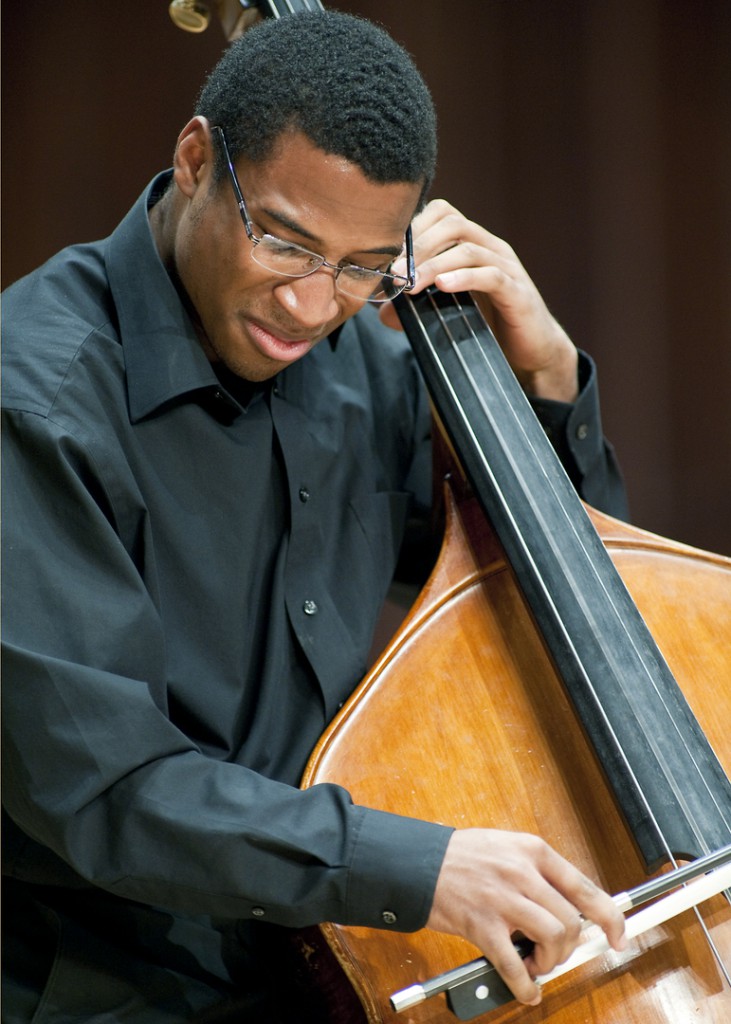Xavier Foley brings high entertainment to low instrument at Gardner Museum
Double-bassist Xavier Foley’s Boston debut on Sunday at the Isabella Stewart Gardner Museum’s Calderwood Hall displayed musicianship that has earned him several honors at just 24 years old. Among other distinctions, he has received an Avery Fisher Career Grant, won two International Society of Bassists competitions as well as a Young Concert Artist International Auditions prize. He appeared as soloist with the Atlanta Symphony and Philadelphia Orchestra and is now a resident artist with the Chamber Music Society of Lincoln Center.
Along with his piano accompanist Kelly Yu-Chieh Lin, Foley’s selections and performance—not to mention his stage presence—were engaging throughout this afternoon recital. After a charming explanation of the bass’s C extension, he began with Schubert’s “Arpeggione” Sonata in A Minor, D. 821.
Originally written for an obsolete six-stringed bowed guitar, this emotionally charged work has survived in various transcriptions. Foley incorporated versions for viola and bass, explaining that the viola transcription offered more comfortable, pleasing octaves at certain points.
The first movement Allegro moderato spotlighted the bassist’s smooth fingering and sheer energy. Hard attacks were used for dramatic effect and a sense of release amidst all the tension. Big musical gestures and impressive technique never detracted from poignant lyricism. Even subterranean tones in the Adagio remained melodic. Foley’s tone extended from a warm grain with an evocative vibrato in the lower and middle registers to a reedy, throbbing but still focused top.
Gracefulness and strength marked the final Allegretto, with its influences from Hungarian tunes and Viennese dances. The wide, waltzing intervals also injected brief comic moments. The piano often introduces thematic material in this sonata and interacts with the soloist and Lin consistently matched Foley’s bass in feeling without covering it in volume.
Foley has said that he plays Mozart’s Violin Sonata in E Minor (K. 304) simply “because the writing is so good.” This moody two-movement work was written as a work for piano and violin as equal participants, yet his broad phrasing, dramatic entrances and sudden dynamic juxtapositions in the opening Allegro naturally drew in the listener.
Yet this Romantic reading of Mozart didn’t overwhelm its Classical dimensions. Historians believe Mozart may have composed this work with the recent death of his mother in mind. With Lin’s prominent pedal introducing Tempo di menuetto, the bass’s immaculate trills and plaintive upper register conveyed the utter dejection of a giant’s slow, steady tears.
Foley’s own upbeat Irish Fantasy for Solo Double Bass ended the first half of the program. He played part of the seventeenth-century Irish air, “The Clergy’s Lamentation,” that inspired his composition before plunging into a virtuosic expansion full of aggressive bowing, syncopated accents and visceral double-stops. As a composer, Foley shows ta sense of playful curiosity: hints of minimalist repetition and dissonant, etude-like patterns emerged, with the piece about to swerve into atonal lines before its abrupt end.
Another original work, the atmospheric “Star” Sonata for Double Bass and Piano, opened the concert’s second half. The first movement, “Obscurity,” began with disembodied chords clustering into a theme that was interrupted by a chase between bass and piano until a tender melody finally peeked through. The brief second movement, “Gravity Waltz,” centered on an agitated conversation between the two instruments in abstract phrases and contrapuntal sixteenth notes. The third and final “Shards of Light” section was a feature for the bassist’s dexterity and clear interest in jazz: the bluesy pizzicato melody, deconstructed bop chords and panoply of slap effects sounded completely improvised.
After chatting with the audience while someone retrieved his sheet music, Foley honored his host town with Bernstein’s “For Serge Koussevitzky.” The beloved New England composer and conductor dedicated this gloomy song, based on a four-note ascending motif, to the legendary Boston Symphony Orchestra conductor and esteemed bassist as part of Seven Anniversaries for piano. It seemed like an unusually downcast tribute but was well-suited to Foley’s hairpin articulations and resonant lines.
Foley’s arrangement of Iranian composer Rouhollah Khaleghi’s “Tasnif Khooshe Chin” (Grape Harvester’s Ballad)” adapted the grooving polyrhythms of a ten-person Persian ensemble. Even for a bassist as agile as this one, the playing turned slightly ponderous, yet Foley did lay down the catchy theme with conviction. Despite some difficulty in the highest range, the young soloist/composer’s excitement made this a worthwhile experiment.
Russian composer (and Koussevitzky collaborator) Reinhold Glière’s Intermezzo and Tarantella concluded the concert with a concise showpiece. In just under nine minutes, he sang through his instrument in the lush first section and danced over Lin’s chimes for the bouncing second one. Clarity of line and rhythmic cohesion were constant even in the most intricate divisions.
The bass is often perceived as an unwieldy solo voice, but Xavier Foley’s virtuosity and expressiveness made such impressions seem outdated.
The Gardner Museum’s weekend concert series will feature the Boston Children’s Chorus 1:30 p.m. Saturday, April 13, 2019 in Calderwood Hall. gardnermuseum.org; 617-778-2242
Posted in Performances

Posted Apr 09, 2019 at 1:51 am by Rumano solano
Impressive young talented player,one of his kind in those modern times bravo